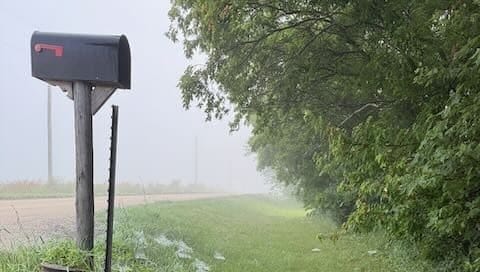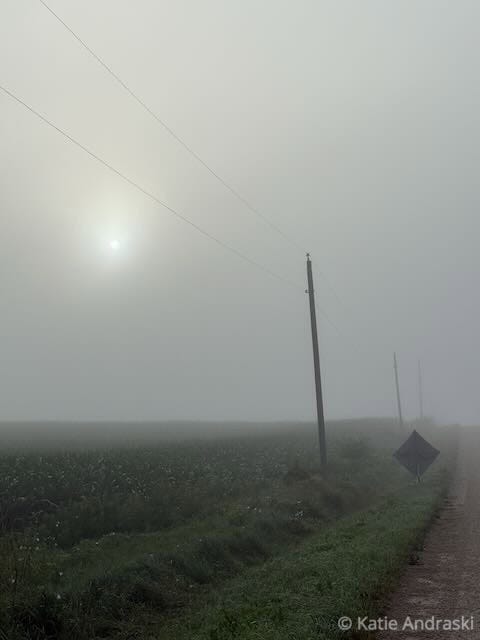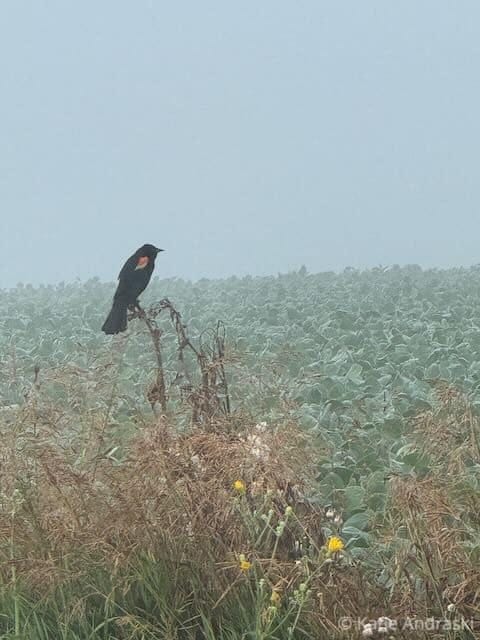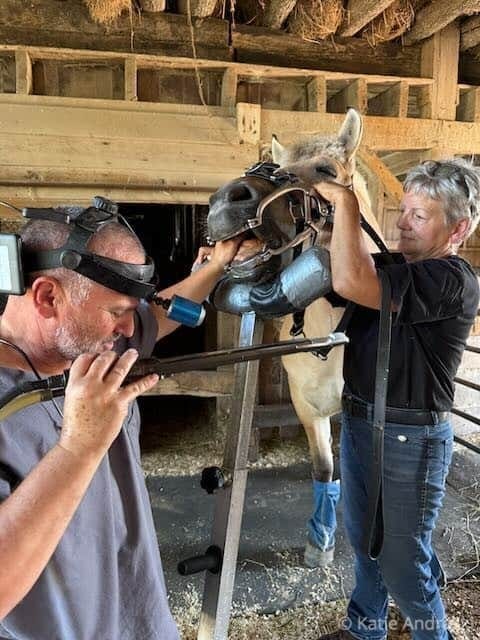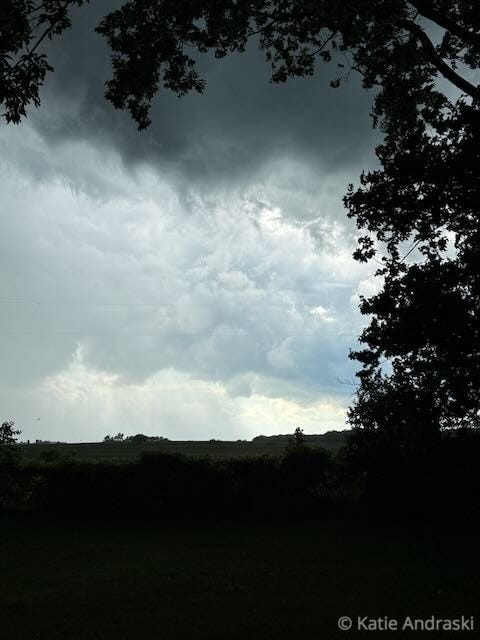Despite road noises, the air itself was quiet when I walked out. Everything was washed gray, the sky, the air, the distant trees and farms. As I turned the corner by our mailbox, I saw several cobwebs spread like mini blankets on the ground. I spoke to the birds—grackles, kildeer, red wing blackbirds. As I turned toward the sun I could face him, cloaked in the clouds, and thought about how God did King Saul dirty.
I don’t get it. If God had left the man alone, maybe he would have died in obscurity, but he would have lived a life, that might have been safely hidden, and humbly righteous.
Is Saul’s story about too much Spirit without enough spiritual discipline? Or did Saul’s insecurity drown out the new heart and Spirit God gave him? Samuel, the man who heard God’s voice as a child, dedicated to God by his mother, loved him and mourned so hard when God rejected him, that God had to say get a grip, I’ve picked someone else. He loved Saul so much he came back from the dead to promise Saul would soon die.
Looking at the 2000 years of church history, I wonder are we any different?
The Daily Office has paralleled the story of Bad King Saul with Saul the killer of Christians until he converted. I wonder if that’s deliberate. Is the name Saul redeemed in Saul, then Paul the apostle’s story, his being struck down by the uncreated light of Jesus?
In a private class Jonathan Pageau urged us to not be afraid of difficult Biblical stories, to perhaps imagine what it was like to be someone like Saul. So here is my imagination:
You’d think being tall would garner respect, but it brought mocking. “Did your mother mate with a Nephilim,” his friends taunted. Often Saul hid himself by the river, practicing swordsmanship with a dried-up branch. He trained the donkeys, wrestling them into obedience. He grew strong and lonely. His heart leapt up when Samuel agreed to grant the people’s call for a king because he loved Samuel’s words: “The king will take your sons and appoint them to plow his land, fight his battles. He will take your daughters and make them cooks and perfumers. He will give his servants your best vineyards, olive groves, fields. He will demand taxes from your work.”
Saul was fast asleep when he heard the hooves of his father’s donkeys. He must have left the gate open. He fell back against his mat and buried his face in the sack cloth he used as a pillow. And sleep took him, plunging him deep into his longing to be king—his brain flashed with oil running down his beard, what little he had, the savory smell of meat burning mixed with the sting of hair on fire, the smoke rising. The prophet shrieking, what have you done? Then he saw a strange king, filled with fear and sorrow, so he spared him. Then the prophet’s rage, a dagger slicing the king, spattering blood. The torn robe.
His father shook him hard. Saul swam up from the dream. He woke shaking. “Did you leave the gate open?” his father shook him. Again. “The donkeys are gone. Take the young man. Go find them.” His father’s voice sliced through his dreams. He didn’t have to say, “No good. Good for nothing. You will come to nothing.” His face said it all.
No donkeys at the closest arabah. No donkeys at the next one. They walked through the hill country. Up one hill and down another with the next hill and valley holding out hope the donkeys might be there. Sometime Saul and his servant called their names. Echoes came back. They walked through Ephraim. They walked through Shalishah. The walked through Shaalim. They walked through Benjamin. Their legs ached. Their feet were crusted with filth. Saul’s heart sank into these words: I’m no good. I can’t even find my father’s donkeys. He turned to his young man, “Let’s go back. My father will worry if we’re gone much longer.” He could not look his servant in the eyes, so looked off to the sun breaking through shadows on the hills.
“There’s a prophet near here. Everything he says comes true,” his servant said, eyes sparkling. “Perhaps he can tell us which way to go.”
“We have nothing to bring him.” Saul shrugged his shoulders.
“I have a quarter a shekel of silver.” His young man held out the coin.
They walked up yet another hill, the women coming out to draw water, saying he’s just ahead. (That image of women coming to draw water sings of bride and bridegroom Isaac and Rebekah, Jacob and Rachel, Moses and Zipporah and Jesus and the woman at the well.) Only there is no human woman to marry, but Saul will be betrothed to Isreal, when Samuel poured oil over his head.
I don’t know how God spoke to Samuel, whether he appeared to him, brighter than the sun, or he came as a voice like he did when Samuel was a boy. God says, “I’ve seen my people. Their cry has come up to me.” Is that the same cry that came up when Abel was killed? The same cry that came because Sodom was so evil?
God nudged Samuel, “Here he is. He will restrain my people.” Samuel turns to see a dusty, tall man, whose looks make him step backward, they are so fine, despite the dust, despite the weariness in his eyes. And a kind young man beside him.
Restrain? So Saul with deliver and restrain them? Does that mean give them what they wanted? Give it good and hard?
“We’re having a sacrifice. Please join us. We’ve prepared a place for you at the head of the table. Your donkeys have been found.”
It dawns on Saul that this is Samuel, the prophet who said Isreal could have a king. He sees love in his eyes and a touch of joy mixed with sadness, an expression he’d never seen in his father’s face.
Saul drops his eyes. “Who am I. I come from the least tribe, the humblest clan that you’d talk to me this way?” How would he bear the eyes of the people, as he tore meat off the bone? When he heard his mother saying, “Where are your manners?”
Send your boy ahead, Samuel says the next day. When he is out of sight, Samuel pours pure golden olive oil over Saul’s head. He is blinded by the oil as it runs over his eyes. His hearing is muffled. His hair is matted. But the smell that rises is like honey. “You are now prince over God’s people. You will deliver them from their enemies.”
I think about the song: How good it is to “dwell together in unity. It is like precious oil poured on the head, running down on the beard, running down on Aaron’s beard, down on the collar of his robe” (Ps 133:2, NIV).
Samuel spells out what’s going to happen. And it does. Then Saul must wait seven days.
When Saul meets up with prophets and prophesies with them. What was that like? Did he speak in tongues? Did he say things that later came true? Did the words that came out of his mouth carry dread and joy both, a warning about what’s to come? Did he go on a giant ego trip? Here’s my imagination:
Saul felt like he was going to fly, his body filled with wind so hard he could hardly breathe. It felt like the hot winds pouring off the hills, withering everything. It felt like the fires that followed. He felt weighed down, like the yoke he lifted on his oxen had settled across his shoulders. Fire tickled above the others’ heads. He sang words he didn’t know. His mind’s eyes filled with fields of slaughtered warriors, their blood fertilizing the ground, the sure signs of victory. He heard a lyre, the fierce words: “For you save a humble people, but haughty eyes you bring down. For it is you who light my lamp; the Lord my God lightens my darkness. For by you I can run against a troop and by my God I can leap over a wall” (Psalm 18: 27 – 29).
God gives him a new heart.
Isn’t that the promise in Ezekiel and in Jeremiah—God will replace our heart of stone and give us a heart of flesh? I long for my scarred over heart to be healed, the scarring a natural defense, when hurt upon hurt piles on. A heart of flesh sounds like a great and good promise.
Samuel gathers the whole nation of Isreal to announce who will be their king, by drawing lots. People held each other’s hands. They held their breath in anticipation. Could it be one of their fathers? Brothers? Sons? The lot fell on the Benjamin tribe. Then it fell on Saul’s family. And then Saul himself. But God had to tell them he was hiding in the baggage. “Do you see who the Lord has chosen? There is no one like him among the people.” But Samuel’s words didn’t bolster Saul’s confidence. Saul’s eventual victories in battle didn’t bolster it.
Samuel sent everyone home including Saul. God touched the hearts of mighty men of valor, who went home with him, though there were others who groused about his abilities to save them. Saul knew this but held his peace. After Saul defeated the Philistines, people asked if the dissenters should be put to death. “No not on the day the Lord delivered us.”
These thoughts tossed around in my head as I walked. I greet the red wing blackbird and grackle that perch on the electric wire. I stepped to the side to stay out of the way of a neighbor’s pick up. I hold onto Oma. She sits. I slip her a treat. I smiled and waved. I turned around when I got to Mr. P’s farm and noticed morning glories that are striped pink and white. Everything else was smeared gray and beautiful, the monochrome easy on the eyes. So often it is hard to walk into the morning sun. At home I pulled out the hose to rinse off Omalola’s legs which are coated in road dust she picked up by sniffing the smells in the wet grass. She dances and steps away as the cold water runs down her legs and along her paws.
Dr. Kevin, arrived in a few hours to smooth down Morgen’s teeth. Horse’s teeth continue to grow, and can grow unevenly, stick points into their gums. He stuck her with sedative and Morgen’s head drooped. Then he put a halter on her with two bars. He sticks those into her mouth and cranks them open.
I say how I feel guilty not paying attention to her. If she sees me outside, she whinnies as if to ask, “Why are you playing with that mutt? Come play with me.” Most days it’s all I can do to curry and brush her. Dr. Kevin’s assistant, held up her head and set it on a padded cradle. Kevin squatted and put the grinder into her mouth. “Don’t feel guilty,” his assistant said. “She’s having a good life.”
It’s the guilt I need to put away. It’s the guilt that drives me away from her.
So what happened to Saul? He had a new heart. He was filled with the Holy Spirit. So why did Saul fail so badly that God replaces the Holy Spirit with an evil spirit and sends David who captures his son, his daughter’s and his own heart with passionate love? That passionate love flips to envy and Saul is tormented by the painful, jealous making saying: “Saul has struck down his thousands and David his ten thousands." When David enters the palace, Saul’s jealousy blooms. Fear rides in hard.
So just what did Saul do to knock the Holy Spirit out? To welcome the evil one?
As far as the eye could see Saul saw the Philistines gathered on the plain. The smoke of their campfires filled the sky. If their armor caught the sun a certain way it blinded him. The people scattered, hid themselves in caves and behind rocks. Isn’t that what will happen in the Day of the Lord? The cave system behind Saul beckoned him. It was all he could do to resist backing into the darkness and letting the Philistines take over.
Where is the prophet? Where is the warrior God, roaring ahead with darkness and flashes of lightning? Terror burned his heart and stung his eyes. So he did it. He offered the burnt offering. The savory smell of meat burning mixed with the sting of hair on fire, the smoke rising. Samuel prophet shrieked, “What have you done? The Lord would have established your kingdom over Isreal. Now it will be no more.” Samuel’s eyes were full of fury and love and grief. Saul saw his sons' bodies hung on posts in those eyes. With a whoosh of wind, the Spirit swept out of him, and a cave wider, deeper, darker than the one behind him opened inside.
St. Porphyrios in Wounded by Love, warns, “Your spiritual guide will teach you to get into the right order for prayer, because if you don’t get into the right order, there’s a danger of your seeing the luciferic light, of living in delusion and being plunged into darkness, and then one becomes aggressive and changes character and so on. This is the splitting of the personality” (124).
Is this why God took away the Holy Spirit and sent an evil spirit? The new heart, the Spirit falling on Saul was too much? Did all that spiritual power go to Saul’s pride? Or did it make him feel even smaller? It’s the saints who say they are more aware of their sin the more saintly they are. But he did have a spiritual guide in Samuel who loved him dearly, who mourned so sharply that God told him to get a grip, go anoint David king. Why couldn’t Saul trust that Samuel would come back when he said he would. Why couldn’t he wait, wait I say on the Lord?
Saul’s foolishness grew.
When God told Saul to completely wipe out the Amalekites, he spared the king and the best of the livestock and goods. Was this compassion gone amok? Or greed for spoils that were too good to destroy? Samuel finally names Saul’s failure, “Even though you are small in your own eyes, are you not head of the tribes of Isreal?”
He spoke a fierce poem about obedience:
“Does the Lord delight in burnt offerings and sacrifices
as much as in obeying the Lord?
To obey is better than sacrifice,
and to heed is better than the fat of rams.
23 For rebellion is like the sin of divination,
and arrogance like the evil of idolatry.
Because you have rejected the word of the Lord,
he has rejected you as king” (I Sam. 15: 22- 23, ESV).
Saul cries out “I’m sorry. I’m sorry. The people frightened me.” The cave, the darkness rising from his chest to his mind. "The glory of Isreal has rejected you. He’s done. He won’t turn toward you again.” Samuel walks away. His white hair is tied in a long tail down his back. His robe glows. Saul grabs it. Tears it. It burns his hand. Samuel turns, his face black as the darkness growing inside Saul. “The Lord has torn Isreal away from you and given it to a neighbor.”
“I have sinned. Please don’t leave. Please. Come with me so I can bow before the Lord in front of the elders.” The darkness wonders how it would look to the people if Samuel leaves him standing, not prostrate before the Glory.
Samuel turns back and Saul bows before the Lord, the dust spotted with his tears. The elders have no idea, he is no longer king. Then Samuel hacks Agag, king of the Amalekites to pieces. “You made women childless, so shall your mother be without you,” he seethes. Saul is speechless before the horror that splatters on his hands and legs and feet.
From then on Saul spins apart. God sends an evil spirit, so fiercely that Saul hires David to sing Psalms on the lyre, those poems calming his mind. Is that evil spirit about God giving him up to his own devices because he failed to wait for Samuel to make the sacrifice, and failed to completely destroy the Amalakites? Is that a picture, of our own need to clean up our lives, take seriously the call to obedience? Is it a story that urges us to work out our salvation with fear and trembling? Are we being warned to trust the Lord, no matter how he honors us, no matter how wide our fear grows?
My heart goes out to Saul, crowned king, a man who could not, would not choose life, by defying his fear and choosing to trust Samuel’s words. In the end he is so terrified because God has gone silent, he hires a medium to call up Samuel. When he rises from the ground, she says he looks like a god. Samuel says again, “The Lord has torn the kingdom from you and given it to David, your neighbor. We’ll be together in Sheol in a day.”
Is this a warning to us, that no matter what spiritual gifts we have, what good heart we have, that we need to submit to healing how we see ourselves? Maybe Saul’s true nature was as king, a nature God called forth, but Saul rebelled against his calling, giving into fear. He couldn’t sit still in his fear, the people’s fear and trust Samuel’s word. He couldn’t sit still and wait. But wouldn’t it have been mercy to leave him alone with his donkeys and not call him to kingship?
God I don’t understand this story. And I’m not even talking about the genocide. It frightens me, how we are so free we can choose insanity, fear, chaos. In the voice of the warning of this story, that can sprout a terror that drives me from you like guilt drives me from Mrs. horse, I am going to trust what Jesus himself says, “Anyone who believes in me I will in no wise cast him out.
There is hope when Samuel comes back from the ground, from the dead and says today you will join me. I’d think where Samuel was, was a good place because he was a holy man, resting in paradise. And later, much later there is Jesus himself getting down to earth, there in Sheol pulling the saints out, even the broken ones like Saul.
I have ached for rain with an almost a physical ache. I stood at the north gate, by the popple tree, the most high tree on the farm. At first I thought the wind had caught the leaves, making them whoosh. But there was no wind. Omalola sniffed in the bushes by the outhouse. I heard rushing water like a river, a mile away, rain, finally rain pouring down. Then it smeared over the woods two fields over. I pulled Omalola to the house, with enough space between drops not to get wet. We jumped on the porch, when the rain slapped the roof. Then nickel sized hail knocked on the windows.
If you liked what you read here, and don’t have the funds to subscribe, here’s a way to leave a tip.

